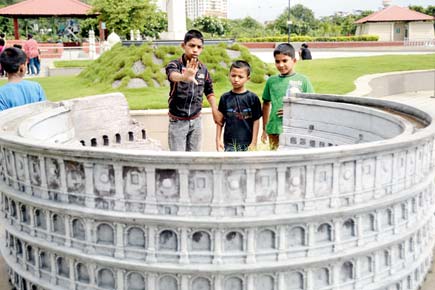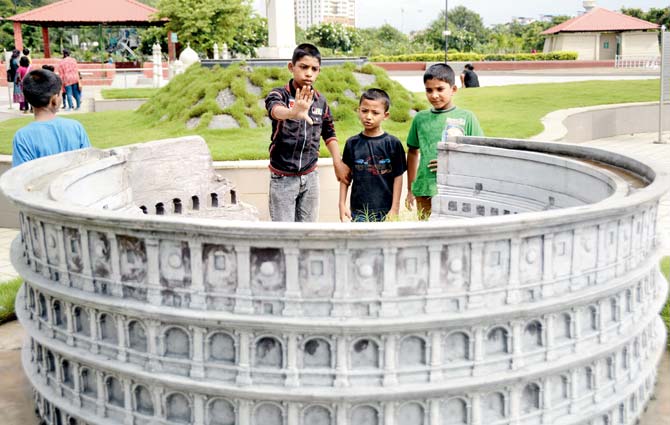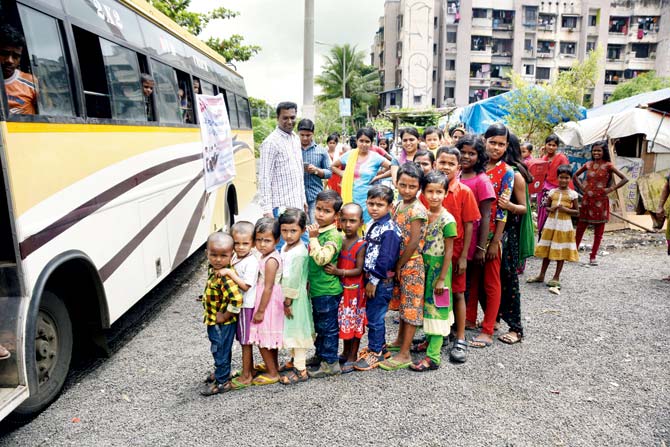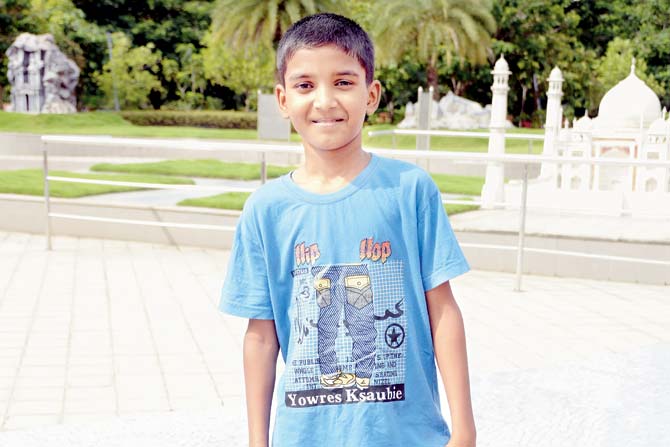For the 40 children who waited at Kamothe Sector 9 in Navi Mumbai, their eyes peeled to catch sight of a 60-seater bus, school that day had shifted to Wonder Nature Park in Nerul


For the 40 children who waited at Kamothe Sector 9 in Navi Mumbai, their eyes peeled to catch sight of a 60-seater bus, school that day had shifted to Wonder Nature Park in Nerul. While average kids enjoy their time out on weekends, this bunch dedicates three hours each on Saturdays and Sundays to learning. And they hardly mind.
ADVERTISEMENT
Alankar Ambwade, 31, who runs the three-year-old Panvel non-profit, Atmanirbhar Foundation, is their instructor. "You don’t need four walls for a school. Any place can be converted into a learning centre as long as you encourage children to observe and question," he says, helping the kids hop on.
The mechanical engineer heads the recently launched Mumbai chapter of the famed Museum School of Bhopal that won the prestigious Wenhui Award of United Nations Educational, Scientific and Cultural Organization (UNESCO) for innovation in education last year.

Stephen Emmanuel, 12, lauded in the group for his voice, says this is their second trip to the park, and the adventure rides are a favourite. Emmanuel is a resident of the Immanuel Mercy Home Ashram in Panvel. Several of his friends are also on the bus; the rest live in nearby slums. They are singing Hindi film songs to clapping hands when Ambwade says their keenness to come to the Museum School stems from the opportunity to learn beyond theory. "The first time I handed a slum kid a book on animals, she asked me, why are animals always in books? She had never visited a zoo. The thrill of learning about creatures while using all their five senses was quite an experience."
Ambwade, who found out about the school from a friend, spent four days in Bhopal watching Pradeep Ghosh, an Ashoka fellow, and wife Shibani, at work. The couple launched the project in 2005, now funded by the Dorab Tata Trust, which now runs in collaboration with five museums including the National Museum of Mankind and the Regional Science Centre. With the government on board, museum access is free. The instructors, who are picked from B.Ed colleges, find this the perfect opportunity for mandatory practice training. The exhibits in each museum are mapped and corresponded with the curriculum of various standards. The plan, says Ghosh on his website, helped them address various components of quality education -- the best infrastructure no school can create (museums), top-notch teaching aids (exhibits), and qualified instructors (B.Ed students doing their best to secure good grades) -- at no cost.

Stephen Emmanuel, 12, lauded in the group for his voice, attended the Museum School for the first time during our visit. Emmanuel is a resident of the Immanuel Mercy Home, an orphanage at Chiple Village, Panvel
Within 20 minutes, we are at the Nerul park that houses miniature versions of the seven wonders of the world. The children are split into groups of five, based on their age and IQ. Ambwade has designed the curriculum after referring to subjects in the state education books. "For instance, if Renaissance is a subject for a Std X student, we’ll try to incorporate it in our model for a 15-year-old," he explains. Guided by a volunteer, each child is encouraged to observe the details on an exhibit. After 15 minutes, the groups congregate at the original spot, and members are encouraged to describe what they observed in a bid to hone cognitive skills, says volunteer Shailendra Shinde, a qualified engineer. The children are even encouraged to weave a story around an object using their own imagination. "Why should the roof of a house be brown. Why not purple or red?" he adds.
Once the child has played his/her part, the volunteer explains the actual historical story behind the artefact.
The age group, we realise, is varied. The youngest member is three and the oldest, 14. "Even if a group has one child who’s five and the rest are above 10, we manage to teach them accordingly. For instance, I’ll explain the dynamics of a sound travel to a 14-year-old, but to a five-year-old, I’ll first ask him to play a sound instrument," adds Shinde.
The boys from the orphanage turn out to be more articulate than their slum counterparts. Roshan Palemukya, 8, has narrated his idea of the Colosseum, an elliptical amphitheatre in Rome, using the now legendary cinematic characters Bahubali and Katappa. "I do like my school, but I like this class better because I can play and learn," he says. All the children from the orphanage go to a regular school, while the slum kids only come to Museum School.
On February 21, when Ambwade along with 13 volunteers first visited the slum to discuss the concept, 20 children came forward. The number now stands at 40. "Did you see the number of parents gathered to escort their kids to the bus? Initially, they were hesitant to sign up. They thought it was a child trafficking racket," he says. After three months of conducting class within the slums and interacting with the parents, the educators share a relationship of trust with the residents. The more enthusiastic ones work on their cynical neighbours.
The Ghoshs, who now work with 200 registered slum students with regular attendance from 160, visited Mumbai earlier this year to train the volunteers. The two-day workshop was conducted at the three museums that have signed up -- Chhatrapati Shivaji Maharaj Vastu Sanghralaya, Maharashtra Nature Park and Nehru Science Centre. "There is disparity between urban and slum area education opportunities, and it is widening every day. I wish to bridge the divide," Ghosh says.
In the absence of a sponsor, the Mumbai chapter is being run by Ghosh and the volunteers who donate 10 per cent of their salaries to the cause. He and Ambwade have had to surmount logistical challenges, too. Because Navi Mumbai doesn’t have a single museum, they must travel into town. A plan to digitise material and hold 3-D screenings of museums at auditoriums in Navi Mumbai is on the cards. They wish to expand the initiative across the city but are facing a crunch of volunteers. "Because it is not a regular school, we must make sure that the teachers are interested in what they do," he says.
 Subscribe today by clicking the link and stay updated with the latest news!" Click here!
Subscribe today by clicking the link and stay updated with the latest news!" Click here!







